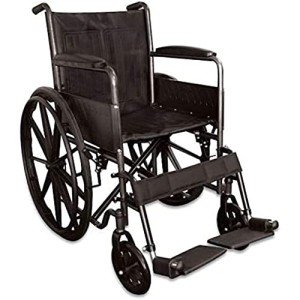Bariatric Folding Wheelchair
Bariatric folding wheelchairs are created to accommodate users of a larger size. They feature a higher weight capacity than standard designs and are built with enhanced materials for added stability and durability.
However, not everybody with a high body mass index (BMI) needs a bariatric chair as many fall within the safe weight limits of standard wheelchairs.
Size and Weight Capacity
Bariatric wheelchairs have wider seats and are developed to accommodate bigger people, generally weighing up to 500 pounds. These chairs have a heavy-duty frame made from strengthened products like steel and are developed with bigger wheels that supply more weight distribution and maneuverability for bigger users.
When comparing bariatric wheelchairs, make sure the weight capacity is noted as fixed or active load. Fixed weight capacity describes how much a chair can hold when it's sitting still, while active load capacity is determined by putting the chair through a drop test that replicates somebody plopping down into the seat.
bariatric wheelchair scale are commonly produced and designed for users with average body weights, making them more budget-friendly than bariatric designs. Medicare and other insurance coverages might only cover a minimal number of bariatric wheelchairs, depending upon a patient's medical requirements and medical diagnosis. These chairs are also more expensive than basic wheelchairs because they have a customized style and building. However, they are a terrific solution for clients with a broad range of medical conditions that require a more comfy travel experience.
Seat Dimensions and Comfort
Unlike standard wheelchairs, bariatric models have larger seats to accommodate larger individuals. They likewise have more robust frames and large, long lasting wheels that can hold up against higher loads. They can be personalized with numerous seating choices and accessories based upon the user's requirements and choices.
When comparing wheelchairs, it's crucial to look at their weight capacities under both static and active load ratings. Fixed load describes the chair's optimum capacity when it's sitting still, while active load measures how much a wheelchair can securely hold when someone beings in it and walks around. Some manufacturers may also show the weight limit of a bariatric wheelchair in kilograms, which is frequently more accurate due to the fact that it takes into account the average bodyweight of a person who utilizes the chair.
In addition to a large seat, a bariatric folding wheelchair ought to have adjustable padded leg rests to help users remain comfy while taking a trip. It should also have flip up armrests that can be moved out of the method to prevent getting in the user's way when they wish to stand up or transfer to another surface.
If you're considering a bariatric wheelchair, ask a healthcare provider or mobility professional for recommendations. They can examine your requirements, advise the right chairs for you, and guide you through the process of buying one. They can also help you compare features and costs to find a wheelchair that best fits your budget plan. They can even offer recommendations on other mobility services such as power positioning systems and iLevel seating.
Weight and Portability
While basic wheelchairs are normally budget-friendly, bariatric chairs tend to be a bit more pricey. This is because of their specialized design and building, along with the fact that they're a little much heavier than their equivalents.
If you're concerned about the expense of a bariatric chair, talk to a healthcare supplier or mobility professional. They'll have the ability to evaluate your special requirements and identify which type of wheelchair is the very best fit for you. They can also advise wheelchair devices based on your specific requirements. In addition, if you're aiming to get your wheelchair covered by insurance, such as Medi-Cal, they can assist you on the steps associated with this procedure. For more information, read our guide to wheelchair insurance coverage. Then, you can begin your journey towards independent mobility.
Manoeuvrability and Handling
Choosing the ideal wheelchair can be an important decision for those with limited mobility. Bariatric wheelchairs offer increased weight capabilities and are developed to accommodate larger people. They usually feature larger wheels, larger armrests and seating choices, and are stronger than basic wheelchairs.
When choosing a bariatric wheelchair, consider the person's specific needs and the environment in which they will be utilizing it. Examine the weight capacity and seat dimensions, and try to find adjustable features like padded raising leg rests to support comfort and ease of transfer.

Figure out whether the wheelchair appropriates for manual or powered usage. For added versatility, a bariatric folding wheelchair can be easily folded and compressed for storage or transport. This makes them a perfect choice for those with restricted home space or who require to travel fars away. The wheelchairs likewise include puncture proof wheels to guarantee durability and low upkeep. Appropriate for users as much as a maximum of 35 stone.
